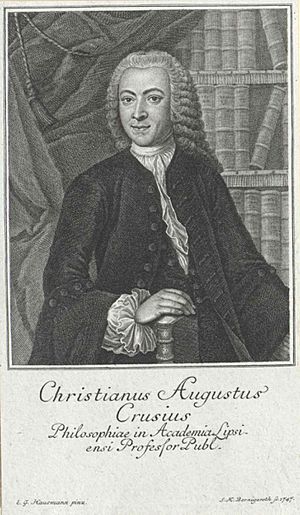Christian August Crusius facts for kids
Christian August Crusius (born January 10, 1715 – died October 18, 1775) was a German philosopher and a Protestant theologian. He was known for his ideas about free will and his influence on other thinkers.
A German Thinker's Life
Christian August Crusius was born in a town called Leuna in Germany. He studied at the University of Leipzig. In 1750, he became a professor of religious studies there. Later, in 1773, he became the principal of the university.
Crusius first became well-known because he disagreed with the ideas of other famous philosophers like Gottfried Leibniz and Christian Wolff. These philosophers believed in something called "determinism." This idea suggests that everything that happens is already decided, and that people don't truly have free will.
Crusius strongly believed that people *do* have free will. He argued that if everything was already decided, then people couldn't be truly good or bad. He wrote several important books during this time, including Guide to Rational Living (1744) and Path to Certainty and Reliability in Human Knowledge (1747).
His ideas about free will and knowledge were important. Even the famous philosopher Immanuel Kant was influenced by Crusius's thinking. Kant owned some of Crusius's books and used his ideas when developing his own philosophy.
Later in his life, Crusius focused more on religious studies. He led a group at the university called the "Crusianer." They had different ideas about how to understand the Bible compared to another group, the "Ernestianer." Crusius believed in sticking to traditional religious teachings when interpreting the Bible.
He passed away in Leipzig.
Crusius's Philosophical Ideas
Crusius's main religious works include Short Outline of Moral Theology (1772–73). His most important philosophical book was Outline of the Necessary Truths of Reason (1745).
He did not like new ideas that challenged old beliefs about the Bible. For example, he believed in the traditional authors of Bible books. He also thought that events and people in the Old Testament were like symbols or "types" of things to come in the New Testament. His views have influenced later students of the Old Testament.
See also
 In Spanish: Christian August Crusius para niños
In Spanish: Christian August Crusius para niños
 | Kyle Baker |
 | Joseph Yoakum |
 | Laura Wheeler Waring |
 | Henry Ossawa Tanner |


